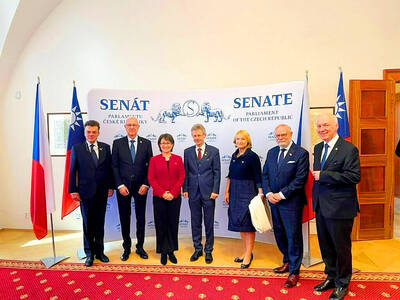A total of eight former and incumbent lawmakers across party lines were found guilty by the Taiwan High Court in a second trial yesterday for accepting bribes from the National Chinese Herbal Apothecary Association in 1998, and all were given sentences of at least seven years.
Former Chinese Nationalist Party (KMT) legislator Hsu Shu-po (許舒博) and Democratic Progressive Party (DPP) Legislator Lee Chun-yee (李俊毅) were sentenced to seven years and six months in prison.
Their civil rights were also suspended for four years and they must each return the NT$1 million (US$30,000) they respectively took from the association.
Former DPP legislator Chiu Chui-chen (邱垂貞) received a 10-year sentence, his civil rights were suspended for eight years and he must return NT$10 million, said the verdict, which also sentenced former KMT legislator Liao Fu-peng (廖福本) to eight years and six months in prison, suspended his civil rights for six years and required him to return NT$6 million in bribes.
CIVIL RIGHTS
Former DPP legislators Jao Yung-ching (趙永清) and Lin Kuang-hua (林光華) both received eight-year sentences and civil rights suspensions of five years.
They must return NT$2 million each.
Former People First Party legislator Feng Ting-kuo (馮定國) was sentenced to seven years and two months in prison, with a suspension of civil rights for three years, and must return a NT$450,000 bribe.
Former KMT legislator Cheng Horng-chi (陳鴻基) was sentenced to seven years in prison, was deprived of his civil rights for three years and must return NT$300,000 in bribes.
In the first trial, only Chiu and Liao were found guilty of accepting bribes.
The eight can appeal the ruling to the Supreme Court.
Yesterday’s ruling said the lawmakers and former lawmakers all accepted bribes from the National Chinese Herbal Apothecary Association in 1996 in return for their endorsement of an amendment to Article 103 of the Pharmaceutical Affairs Act (藥事法) that would restore the right of herbalists to issue medical prescriptions.
The association paid a total of NT$40 million to the lawmakers under the guise of “sponsor funds,” the ruling said.
The amendment was passed in May 1998.
The ruling said the court identified the “sponsor funds” as bribes and convicted the eight of accepting them.
UNACCEPTABLE
Chiu, who received the heaviest sentence, yesterday said that he found the ruling unacceptable.
The money was a political donation, not a bribe, he said.
Noting a recent spate of corruption scandals involving judges, Chiu said he suspected the court had handed out heavy sentences in an attempt to restore some of the authority of the judiciary.
“Are judges crazy?” he said, adding that he would definitely appeal the case.
Jao, Lin and Hsu also protested their innocence, while Lee, Feng and Chen were unavailable for comment. Liao is currently serving time for a separate forgery case.
ADDITIONAL REPORTING BY STAFF WRITER

Two US House of Representatives committees yesterday condemned China’s attempt to orchestrate a crash involving Vice President Hsiao Bi-khim’s (蕭美琴) car when she visited the Czech Republic last year as vice president-elect. Czech local media in March last year reported that a Chinese diplomat had run a red light while following Hsiao’s car from the airport, and Czech intelligence last week told local media that Chinese diplomats and agents had also planned to stage a demonstrative car collision. Hsiao on Saturday shared a Reuters news report on the incident through her account on social media platform X and wrote: “I

SHIFT PRIORITIES: The US should first help Taiwan respond to actions China is already taking, instead of focusing too heavily on deterring a large-scale invasion, an expert said US Air Force leaders on Thursday voiced concerns about the Chinese People’s Liberation Army’s (PLA) missile capabilities and its development of a “kill web,” and said that the US Department of Defense’s budget request for next year prioritizes bolstering defenses in the Indo-Pacific region due to the increasing threat posed by China. US experts said that a full-scale Chinese invasion of Taiwan is risky and unlikely, with Beijing more likely to pursue coercive tactics such as political warfare or blockades to achieve its goals. Senior air force and US Space Force leaders, including US Secretary of the Air Force Troy Meink and

‘BUILDING PARTNERSHIPS’: The US military’s aim is to continue to make any potential Chinese invasion more difficult than it already is, US General Ronald Clark said The likelihood of China invading Taiwan without contest is “very, very small” because the Taiwan Strait is under constant surveillance by multiple countries, a US general has said. General Ronald Clark, commanding officer of US Army Pacific (USARPAC), the US Army’s largest service component command, made the remarks during a dialogue hosted on Friday by Washington-based think tank the Center for Strategic and International Studies. Asked by the event host what the Chinese military has learned from its US counterpart over the years, Clark said that the first lesson is that the skill and will of US service members are “unmatched.” The second

Czech officials have confirmed that Chinese agents surveilled Vice President Hsiao Bi-khim (蕭美琴) during her visit to Prague in March 2024 and planned a collision with her car as part of an “unprecedented” provocation by Beijing in Europe. Czech Military Intelligence learned that their Chinese counterparts attempted to create conditions to carry out a demonstrative incident involving Hsiao, which “did not go beyond the preparation stage,” agency director Petr Bartovsky told Czech Radio in a report yesterday. In addition, a Chinese diplomat ran a red light to maintain surveillance of the Taiwanese